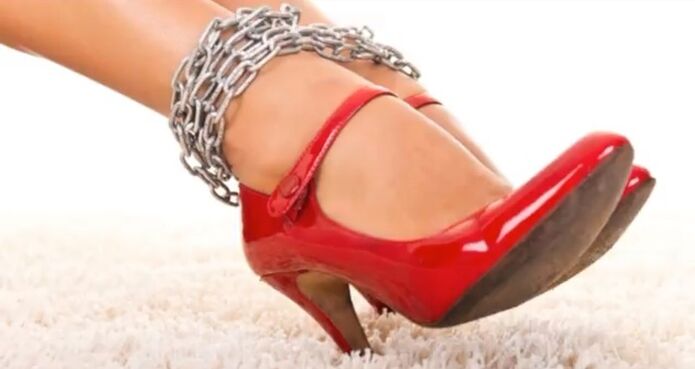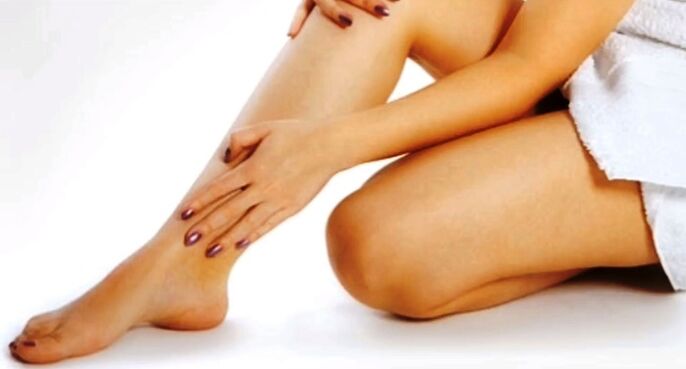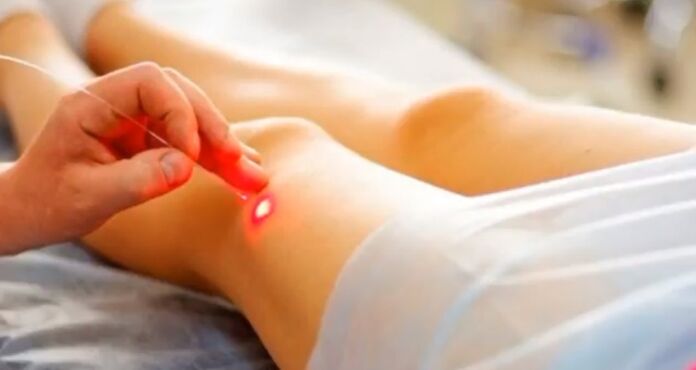Varicose veins or varicose veins are a pathological process that many people face. In most cases, the disease affects the vessels of the legs, leading to their stretching, deformation, thinning of the vascular walls. In addition, the valves located inside the veins cease to fully perform their functions, which disrupts the systemic circulation and blood stagnates in the veins.
Under the influence of the described factors, the vessels increase in size, appear on the surface, showing through the skin. As a result, an entire vascular network is visible on the surface of the skin, often with trophic nodules and ulcers. However, in addition to aesthetic ailments, the problem is much deeper and very often accompanied by painful sensations.
The nature of pain with varicose veins
First of all, it is important to understand that the concept of "very thick" does not mean that pain is accompanied by 100% of cases of varicose veins. Much depends on a number of factors, on the individual characteristics of the patient's body, and even in the later stages of the progression of the pathological process, there may be no pain.
If we classify painful sensations, we will first of all consider their localization:
- In most cases, the pain syndrome is localized directly at the site of the vascular lesions, their deformation.
- In second place in terms of frequency of localization is the area of the gastrocnemius muscle, while the pains themselves are located closer to the popliteal region of the leg.
- The lowest probability of localization of the pain syndrome goes to the ankle area.

Of course, the likelihood of developing leg pain increases as the disease process progresses. This is due to the aggravating state of blood vessels, their increase, the progression of stagnant processes and, consequently, the increase in vascular pressure. Ultimately, the pressure can increase so much that the vessel walls fail, threatening internal bleeding, hematoma formation, and trophic ulcers.
Accordingly, the nature of the pain depends on the degree of development of the disease:
- In the initial stages, painful or rather unpleasant sensations of a pulling or crushing character are caused by swelling of the legs. It is important to understand that along with blood flow disorders, fluid is retained in the legs, causing swelling. In the initial stages, the edema is periodic, appears more often in the evening and the discomfort is caused by fatigue, walking with shoes during the day, in extreme cases by skin tension.
- The fact of fatigue deserves special attention. With varicose veins, the legs get tired faster. Initially, this is expressed during prolonged physical exertion during the day (if the patient stands for a long time, walks a lot, etc. ). However, as the disease progresses, fatigue makes itself felt more often and more intensely, as a result of which characteristic painful sensations are felt. In this case, the pains are dull in nature, even pulling or aching.
- Around the second stage of the disease, with a worsening of the condition of the veins, their more severe deformation and dysfunction of the valves of moderate severity, patients complain of the effect of gravity. In this case the pains are characterized as explosive, in some cases they are even called acute. This is due to the increasing pressure in the vessels, and if at first it is enough to lie down and put your feet on a hill so that the pain recedes, then in the future you will have to cope with them using medication.
- The most likely is the development of pain syndrome, as well as its greater intensity in the case of the progression of varicose veins to the final fourth stage. It is at this stage that vascular deformation and vascular pressure peak.
It is difficult to more accurately describe the characteristics of painful sensations with varicose veins in the legs. This is due to the individual characteristics of the organism of each patient, as well as the characteristics of the course of the disease. However, pain can be perceived as:
- Stupid.
- Pulling.
- In pain.
- Exploding.
- compressive.
- Sharp.
- Similar to rezi.
Even at the second, and even more often at the third stage of the development of the pathology, the pains are accompanied by muscle cramps, which disturb patients mainly during night sleep.

Causes of painful sensations
Understanding where varicose vein pain comes from can help you deal with this problem more effectively or prevent pain from occurring. So, the pains arise under the influence of the following reasons:
- Pathological changes in the vascular bed slow down blood circulation in some areas of the veins. This leads to a decrease in blood flow, as a result of which oxygen deprivation begins and pain occurs.
- The circulation of the blood favors the elimination of waste products, which are constantly produced by the body in small quantities. Due to the decrease in the outflow of blood and its stagnation, decomposition products are slowly removed, which leads to the appearance of toxins that poison living cells, this process also causes painful sensations.
- Trophic disorders that appear in the last stages of the development of varicose veins also contribute to the onset of pain and intensify with the progression of the disease, causing increasingly acute pain.
The pain increases with physical exertion, fatigue in the legs, in most cases it becomes particularly intense in the afternoon or evening.
Methods for dealing with the pathology
For the complete elimination of pain, it is necessary to direct all forces towards the treatment of the pathological process. To do this, you need to consult a doctor who will conduct a diagnosis, on the basis of which he will prescribe a treatment that is more suitable for a particular patient.
The treatment will take a certain period of time, during which the patient will be tormented by pain. Therefore, it is important to understand not only how to deal with varicose veins, but also to know the methods of pain relief.
First aid in the fight against pain
The elimination of pain is only a symptomatic part of the treatment, in most cases it does not affect the solution of the main problem - varicose veins.
However, it is very important to get rid of pain, to consider the main methods of dealing with unpleasant and painful sensations:
- In the initial stages of the development of the disease, the pains are unstable, their intensity is quite low, and they occur mainly in the evening. In these cases it is sufficient to assume a supine position and place the feet on a pillow or simply place them against the wall so that the feet are above the level of the body. This position facilitates blood flow, thereby reducing pain and swelling.
- It is also very useful to do a light massage, kneading the lower limbs with massage and rubbing movements. Remember, you can stretch your legs during the day, which is very useful in the later stages of the development of the disease.

Traditional methods of pain relief
In case of severe pain that constantly bothers you, as well as in cases where there is no way to massage or relax, you should resort to the help of medications. Of course, only a doctor should prescribe a medicine, but in most cases, the following drugs are used:
- Special means in the form of a gel - mainly we are talking about non-steroidal anti-inflammatory drugs (NSAIDs) that effectively relieve pain, as well as having a pronounced anti-inflammatory effect and a moderate antipyretic effect.
- In some cases, you can resort to painkillers, but with varicose veins their effect is insignificant and short-lived. These are mainly analgesics and antispasmodics.
- If the painful sensations are accompanied or aggravated by seizures, it is worth talking to your doctor about the use of muscle relaxants, which help reduce muscle spasms.
- Also, traditional methods of coping with painful sensations with varicose veins in the legs include the use of special compression stockings, stockings or tights. This method is considered the most effective in terms of pain relief, and its effect is the longest. The underwear mentioned should only be purchased at the pharmacy, and as it has different degrees of compression, consult your doctor first.
Folk remedies
In folk medicine, there are also many ways to eliminate or prevent the pain caused by the development of varicose veins. Consider some of the most effective methods and recipes:
- Horse chestnut - from the fruit of this tree an alcoholic tincture must be prepared. To do this, grind 100 grams of peeled chestnuts, put them in a glass dish and pour 500 milliliters of vodka. Put the container in a dark place and leave for 7-8 days at room temperature, mixing once a day. After that, the tincture is filtered and the legs are rubbed with it before going to bed or even during the day if the pains are bothering during the day.
- Products based on beeswax or propolis show high efficiency in the fight against the pain of varicose veins. To prepare the medicine, take 80-90 grams of propolis, grind it and pour 300 milliliters of medical alcohol into a glass container. The agent is infused for 30 days or until the propolis has completely dissolved, all this time it is also kept in a dark place, periodically shaking it. Once the medicine is ready, you can rub your feet or apply lotions.
Pain prevention
It is also important to understand that in the initial stages of the disease, when the pain is not intense or rarely bothers, but the treatment has been started, it will be enough to follow the recommendations that reduce the likelihood of painful sensations:
- Avoid wearing high-heeled shoes.
- Make sure your shoes are comfortable.
- In the cold season, when working indoors, it is important to switch from boots to lighter and more comfortable shoes.
- Try to minimize the stress on your legs.
- It is impossible to maintain a static position for a long time. If you are on your feet a lot, try to sit more, but if you sit a lot, it is important to take periodic walks or at least warm up.
- During the day try to massage your lower limbs, 5 minutes of light massage will protect you from pain during the day.
- It is also important to lead a healthy lifestyle, start light sports, eat right, give up bad habits, etc.













































